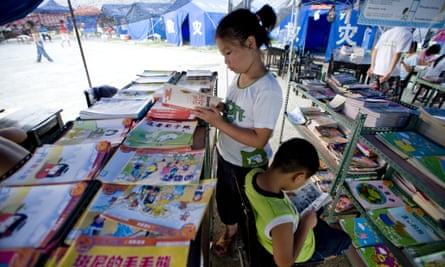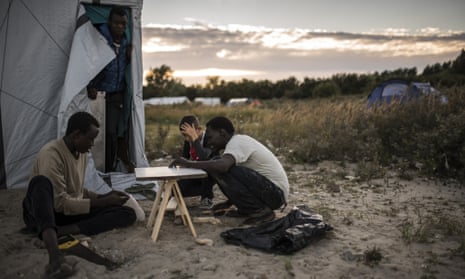Update: Calais refugee library flooded with thousands of books
Volunteers have set up a makeshift library at the migrant camp in Calais which the French authorities estimate now shelters at least 3,000 refugees. The library is just one of the essential services being provided on a voluntary basis at the camp, known as the Jungle, as the refugee crisis in Europe escalates.
Opened by British teacher Mary Jones, who baptised it Jungle Books (or Livres de la jungle in French), the library is stocked with giveaways. Jones herself has been taking books and other items to the camp for years, but wanted to go beyond that, she told Publishing Perspectives. “I wanted to start something that offered real, practical help. Many people here are well-educated — they want to get on and they want books that will help them read and write English, apply for jobs, fill-in forms.”
Jungle Books is at the edge of the camp, explained Roger Tagholm, who reported the story. “They have Gone Girl, Lord of the Rings, Tom Wolfe, John Grisham ... but Jones wants to add books in the native languages of refugees.” Besides stocking around 200 books, the library supports a school that offers classes to the refugees and asylum seekers that live in the camp. The “Jungle” also has two churches, a mosque, grocery stores, restaurants, a bar, a barber and a bike repair shop: “It’s a growing mini-society,” said Tagholm. Jones hopes that eventually, the migrants will be able to run the library themselves.
The page Calais Migrant Solidarity, set up to “document police harassment of migrants and strengthen resistance” in the border town, has been asking for supplies on their site for weeks. Among the items they list are “books, dictionaries, texts, zines etc – in any and all languages.” It has been fascinating, Jones told Tagholm, to discover what books the camp inhabitants ask for, such as short stories and poetry, and she made a call for the following genres: “we need Pashto-French dictionaries, Pashto-English dictionaries, Eritrean dictionaries, books in native languages.” To support Jungle Books, please get in touch with Mary Jones at maryjones@orange.fr.
Books change lives – other libraries in crisis situations
- Only 20 minutes to create a full library: After having built dozens of tent libraries in Haiti after the 2010 earthquake, Libraries Without Borders have been testing their Ideas Box project in Burundi. Using just two shipping pallets and taking 20 minutes to assemble, it can provdide the equivalent of “a small-town library,” as reported in FastCompany. It comes with its own books, ereaders, tablets, laptops and digital tools, as well as internet access and electric power; and the boxes that contain all of these turn into chairs and tables. In April, the project arrived at Syrian refugee camps in Jordan.
- The library run by volunteers at the refugee camp in Minzhu (pictured below) created almost two months after the Sichuan quake, in 2008.

- Truck-library in Saharawi refugee camps: as reported in El País, this mobile library settled in the Smara camp for Western Sahara refugees, in Algeria, in 2008, and it is now part of a network which works with local teachers and hosts book clubs for children and adults. Its name, Bubisher, refers to a desert bird whose arrival brings good luck in Saharan tradition. As of two years ago, it had almost 1,300 members and 6,000 books.
- The Guantánamo library: with 18,000 titles across 18 languages for loan, Guantánamo Bay library has provided detainees with popular fiction (the most popular titles reportedly being Harry Potter books, novels by John Grisham and Agatha Christie and Islamic texts) as well as magazines, DVDs and newspapers. Prisoners can’t access the library premises, but reporters can, which prompted a Tumblr from a New York Times journalist collecting pictures from their visits.
- The Indigenous Literacy Foundation in Australia, courtesy of our reader juneinparis:
Indigenous Literacy Foundation in Australia provides books, learning resources and translation of children's books into traditional language to remote Aboriginal communities for the last several years, it may not seem a crisis or emergency situation, though that is arguable. Regardless, the service has been fantastic. Holding the physical form of the book is the first step in learning to read. Having literacy is the power to have the world lean in to meet us, and us to meet the world. p.s thank you for this story - I've got in touch with Mary and hope to send some books to the Jungle shortly.
- The “Bibliobus” library in L’Aquila, Italy, created after the 2009 earthquake:
In 2009 after the big earthquake that destroyed many lives and the city of L'Aquila (Italy) some citizens and association created a moving library called "BIBLIOBUS" that provided books in the camps and went on during all these years providing culture and becoming a meeting point for people. Today BIBLIOBUS and BIBLIOCASA are still working in a place with still many hardships.
http://www.bibliobusaq.it/bibliobusaq/
- This small street library, installed by arty-social collective Space, Not Spikes, as part of their intervention against brutal ‘anti-homeless spikes’ in London’s Shoreditch. Its shelf of ten books (and one scholarly paper) centres on urban living, inequality and the privatisation of public space, explained reader palashdave 25, whom we thank for pointing us to it.
Do you know of other examples? Have you worked in providing books or literacy-related services in crisis or emergency situations? Let us know in the comments

Comments (…)
Sign in or create your Guardian account to join the discussion